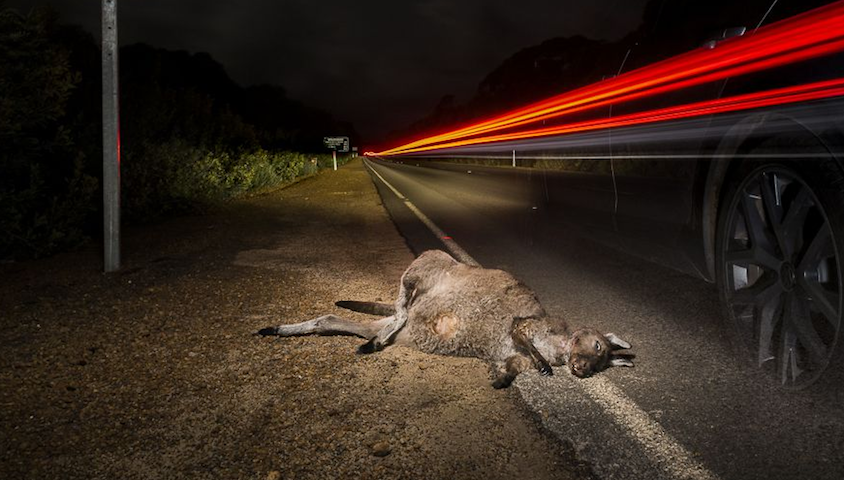The winner of this year’s ‘Our Impact’ category of the Australian Geographic Nature Photographer of the Year awards is calling for public support to introduce duck-to-dawn speed limits in key sections of Kangaroo Island’s 110-kilometre-per-hour roads.
Gimesy has publicly asked the South Australian Road Safety Minister, Sustainability, Environment and Conservation as well as the Kangaroo Island Council to consider changing the limits on local roads, which regularly claim the lives of kangaroos and other native fauna.
The celebrated photographer’s photographic series, entitled ‘Fast roads, slow deaths’, captures the trauma inflicted on Kangaroo Island’s wildlife, as well as the human lives touched by it, aiming to raise awareness of the broader issues concerning wildlife road trauma throughout Australia.
Another image from the series depicts the dedication and affection an orphaned joey receives at the hands of the Kangaroo Island Wildlife Network, which recently made the finals of The BigPicture competition in the US.
“Like a lot of tourists, when I first visited Kangaroo Island my partner and I were amazed by the natural beauty, but we were also shocked by the amount of dead wildlife lining the roadsides,” said Gimesy in a recent press release.
“What really upset us however was the discovery that a lot of the ‘road kill’ didn’t die instantly. Many animals go on to suffer slow, painful deaths on the side of the road or in the bush.”
To help raise awareness, Gimesy has also edited together a brief video that catalogues the emotional toll these wildlife roadside incidents have on local carers. You can watch ‘Roads of distress – Sandy’s story’ on Vimeo.
“Dusk to dawn speed limits have been introduced in other states such as Tasmania, so why not Kangaroo Island?” questioned Gimesy.
“This is an ethical issue. By not actively addressing this problem, the State Government and local council are not doing everything they should to minimise wildlife suffering.”
In response to Gimesy’s call, the local member for Finiss, Michael Pengilly has rejected calls for the introduction of dusk-to-dawn speed limits out of hand, calling them “out of touch with reality”.
“Kangaroo Island residents traversing roads on the third largest Island in Australia do not need advice on how to deal with animals on the road at night, whether they be native or domestic,” Pengilly said.
“As a matter of course, Islanders take extreme care so as not to damage their vehicles or indeed their occupants. From an early age, country drivers across the nation are taught that you never swerve to avoid to an animal for fear of crashing off the road and potentially causing harm or injury to themselves or the occupants of their vehicle.”
Pengilly also noted that visitors to Kangaroo Island were also advised to take “extreme precautions” when driving at night.
“Kangaroo Island is a rural community with predominantly farming families and business operators who value their environment and lifestyle and they do not need to be told how to drive and at what speed to drive at on the roads at night time.”
For more information, or to sign the petition visit the Kangaroo Island wildlife trauma website.



